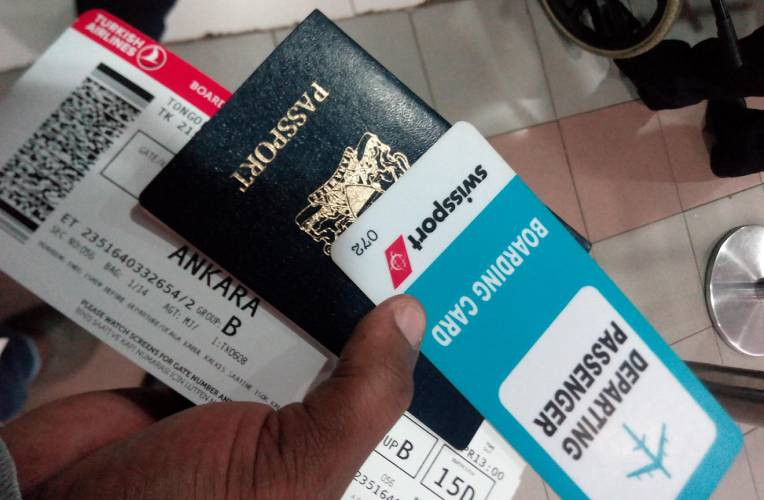How AI can transform informal settlements in Latin America
Across Latin America and the Caribbean, over 120 million people, 21% of the region's population, live in informal settlements, urban territories systematically excluded from basic services, accurate data and climate-resilient infrastructure. These communities are at the epicentre of converging crises: entrenched social vulnerability intersecting with escalating climate risk. Yet, within this precariousness lies transformative potential; the convergence of geospatial technologies and artificial intelligence (AI) is reshaping how cities understand, anticipate and address urban climate vulnerability.
Latin America and the Caribbean is the world’s most urbanized region. Over 80% of the region’s 600 million inhabitants live in urban areas and this is projected to rise to 89% by 2050. This rapid spatial expansion has outpaced formal planning, giving rise to what I term 'anxious cities,' urban environments characterized by persistent uncertainty, vulnerability and adaptive stress responses to overlapping crises. This concept challenges traditional planning assumptions by framing informality not as failure, but as a dynamic coping mechanism in the face of institutional and environmental breakdowns.
Between 1990 and 2015, informal housing grew from 6% to 26% of all urban residences, often emerging on floodplains, steep slopes and coastal zones. These settlements, constructed from recycled materials without drainage infrastructure, are among the world's most climate-vulnerable. Political marginalization compounds the challenge, as communities frequently lack access to early warning systems, disaster response mechanisms and tenure security.
More than half of the population lives in high-risk climate zones, facing intensified extreme weather, including heatwaves, floods, landslides and sea-level rise. Despite contributing minimally to global emissions, informal urban communities disproportionately endure climate change effects, exemplifying profound climate injustice. This stark imbalance highlights the urgency of embedding equity into climate innovation frameworks.
Have you read?
Modern geospatial mapping technologies offer a transformative lens to expose these invisible geographies. High-resolution satellite imagery, drone surveys and Geographic Information Systems have enhanced our capacity to monitor urban change with unprecedented precision. MapBiomas in Brazil exemplifies this potential. It uses pixel-by-pixel classification of Landsat images processed through machine-learning algorithms to monitor land use changes across Brazil since 1985.
The integration of AI into geospatial analysis marks a paradigm shift. The Inter-American Development Bank’s MAIIA project shows how AI algorithms can detect informal settlements with high accuracy by analysing satellite imagery for characteristic patterns, such as irregular rooftops and narrow passageways. This enables rapid mapping of entire metropolitan areas, transforming months of manual surveying into automated processes completed in days.
And, AI’s potential extends beyond static mapping. Advanced algorithms forecast future risks, identify adaptation patterns and support decision-making in previously unimaginable ways, representing a fundamental shift from reactive to proactive urban planning.
Discover
What is the World Economic Forum doing to encourage healthy living in cities?
To navigate the complex challenges of climate resilience, we must move beyond incremental adjustments and design the tools that tomorrow demands. We need a system that harnesses AI to anticipate where climate risks will emerge or intensify. This vision is what I propose as the Predictive Climate Resilience Index. By integrating data on urban densification, geolocated informal employment, internal climate migration patterns and soil permeability with meteorological forecasts and climate projections, such a tool could help identify today’s high-risk areas and tomorrow’s vulnerability hotspots. With this insight, governments and international partners could prioritize interventions before crises unfold.
In parallel, we should explore the development of digital twins for informal settlements: dynamic virtual models that simulate future climate-stress scenarios. These could incorporate hyperlocal data, such as microclimates, water flows, building materials and community infrastructure, enabling planners and residents to preview the potential impacts of interventions. Before a drainage system is installed or a relocation plan enacted, its outcomes could be tested digitally, improving effectiveness and community trust and legitimacy. Digital twins could also support interagency coordination and help prioritize infrastructure investments where returns are maximized for risk reduction and social benefit.
Equally important is leveraging the participatory potential of AI. Machine learning powered platforms could support community-led mapping initiatives, using smartphones to gather granular, ground-level data often missed by formal systems. These include perceptions of risk, traditional knowledge of drainage paths, informal governance structures and mutual aid networks. These approaches affirm a fundamental truth: the communities most affected by climate risks are essential co-creators of the solutions.
Medellín’s transformation through its Proyecto Urbano Integral demonstrates this potential. Combining community knowledge with technical expertise, the city transformed vulnerable informal settlements into urban integration models, reducing homicide rates by over 80% in targeted areas, while improving access to education, healthcare and economic opportunities.
For AI to serve the public good, it must be grounded in climate justice principles. Spatial climate justice algorithms can prioritize interventions based on hazard exposure and on systemic factors: historical residence time, cumulative lack of public service access, gender and age-based vulnerability differentials and community emissions contributions versus climate exposure.
These models ensure AI doesn’t entrench existing inequities, but actively redresses historical injustices. This requires building spatial climate justice into algorithmic logic, moving from neutrality to intentional correction of imbalances. AI implementation in informal settlements requires robust ethical governance frameworks ensuring transparency, participation, privacy protection, accountability and equitable benefit distribution.
Real-world challenges persist. In Colombia, armed groups have constrained data collection in high-risk territories, while in Mexico, top-down mapping initiatives failed due to the exclusion of the Indigenous perspective. These examples underscore the need for participatory and ethical governance frameworks for AI and data use in fragile urban contexts.
The success of AI-enabled resilience depends on integrating variables capturing informal life’s full complexity. Equally, the success of these tools hinges on trust: opaque or extractive systems risk community rejection, regardless of technical accuracy. Socioeconomic metrics – income volatility, informality rates and education access – must be considered alongside behavioural patterns, like risk avoidance strategies, community trust levels and local mobility patterns. Environmental factors, including air and water quality measurements, biodiversity assessments and local thermal conditions, provide essential context.
Low-cost environmental sensors installed and maintained by communities can provide real-time, hyperlocal data, enhancing AI model responsiveness and accuracy. This transforms the traditional technology-community relationship from extraction to collaboration.
Public policies should promote participatory governance structures enabling informal settlement residents to co-design resilience strategies, rather than receive predetermined solutions. Key requirements include digital infrastructure investment, regulatory innovation ensuring data privacy and algorithmic transparency, participatory budgeting for community-led initiatives, institutional capacity building and regional cooperation networks.
The convergence of accelerating climate threats, unplanned urbanization and technological advancement presents unprecedented risk and transformative opportunity. The choices made today about data governance and technological design and who participates in shaping these, will determine whether AI becomes a tool of resilience or deepens exclusion. For 120 million people living in informal settlements across Latin America and the Caribbean, today’s decisions about data governance, ethical AI implementation and community participation will shape their urban future and global resilience planning trajectories.
These anxious cities, characterized by uncertainty and vulnerability, can become innovation laboratories. By leveraging intelligence that is artificial and inclusive, anticipatory and just, Latin America and the Caribbean can emerge as a global leader in urban climate resilience. This framework, combining advanced geospatial mapping, predictive AI, participatory governance and climate justice principles, offers a pathway towards resilient urban futures.
Latin America and the Caribbean stand at a crossroads. The region can remain vulnerable while awaiting external solutions or seize this moment to become the global leader in intelligent climate resilience.
You may also like...
Diddy's Legal Troubles & Racketeering Trial

Music mogul Sean 'Diddy' Combs was acquitted of sex trafficking and racketeering charges but convicted on transportation...
Thomas Partey Faces Rape & Sexual Assault Charges

Former Arsenal midfielder Thomas Partey has been formally charged with multiple counts of rape and sexual assault by UK ...
Nigeria Universities Changes Admission Policies

JAMB has clarified its admission policies, rectifying a student's status, reiterating the necessity of its Central Admis...
Ghana's Economic Reforms & Gold Sector Initiatives

Ghana is undertaking a comprehensive economic overhaul with President John Dramani Mahama's 24-Hour Economy and Accelera...
WAFCON 2024 African Women's Football Tournament

The 2024 Women's Africa Cup of Nations opened with thrilling matches, seeing Nigeria's Super Falcons secure a dominant 3...
Emergence & Dynamics of Nigeria's ADC Coalition

A new opposition coalition, led by the African Democratic Congress (ADC), is emerging to challenge President Bola Ahmed ...
Demise of Olubadan of Ibadanland
Oba Owolabi Olakulehin, the 43rd Olubadan of Ibadanland, has died at 90, concluding a life of distinguished service in t...
Death of Nigerian Goalkeeping Legend Peter Rufai

Nigerian football mourns the death of legendary Super Eagles goalkeeper Peter Rufai, who passed away at 61. Known as 'Do...




